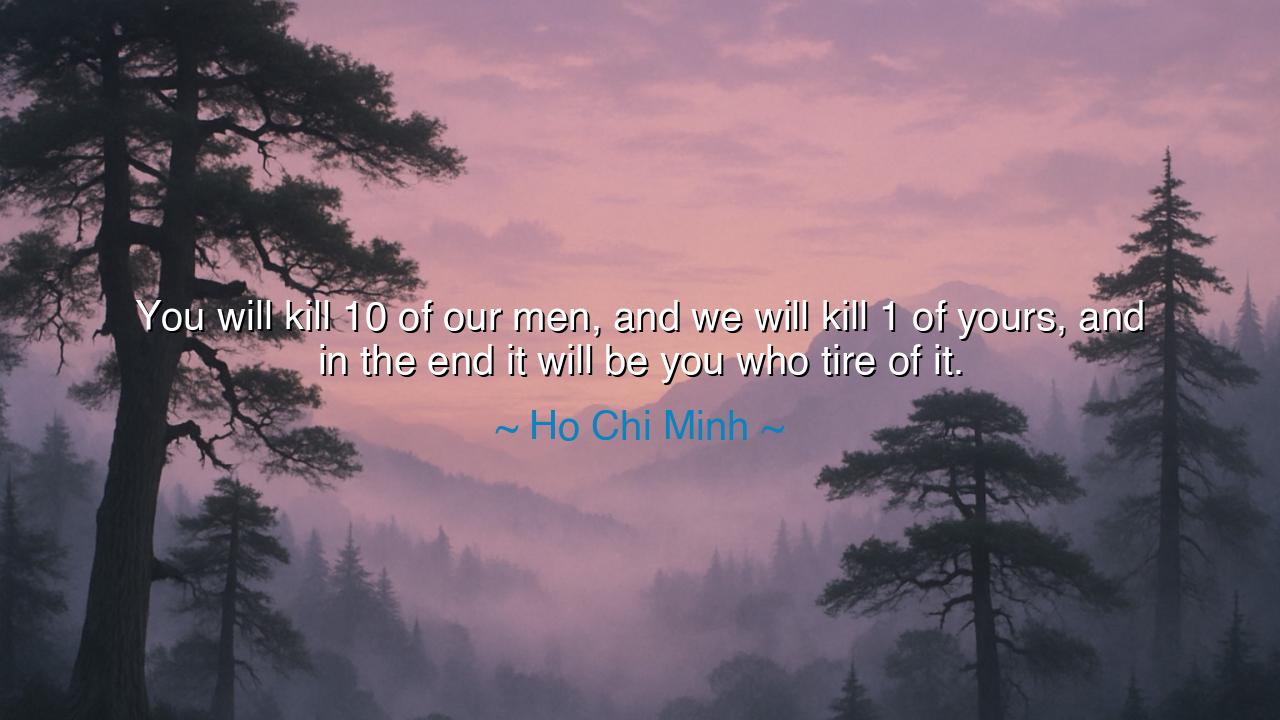
You will kill 10 of our men, and we will kill 1 of yours, and in
You will kill 10 of our men, and we will kill 1 of yours, and in the end it will be you who tire of it.






Ho Chi Minh, the ascetic leader who became the voice of a nation’s endurance, once declared with the calm fire of defiance: “You will kill 10 of our men, and we will kill 1 of yours, and in the end it will be you who tire of it.” These words are not merely the language of war, but of an ancient truth—that the power of endurance, of unyielding resolve, can defeat even the mightiest force of arms. They speak to the strength of spirit over the strength of steel, of patience over speed, of the will of a people against the might of empires.
The meaning of this saying lies in the measure of resilience. Armies may conquer territory, destroy villages, and inflict casualties beyond counting—but if the spirit of the people remains unbroken, their cause cannot be erased. By declaring that his nation would accept tenfold losses in exchange for the endurance of their struggle, Ho Chi Minh revealed the essence of asymmetric resistance: it is not the numbers that decide the outcome, but the will to continue. The enemy grows weary; the occupied become ever more steadfast.
The origin of this wisdom is rooted in Vietnam’s long history of defiance. For centuries, the Vietnamese resisted greater powers—Chinese dynasties, Mongol hordes, French colonizers. Time and again, they relied not upon superior weapons but upon unyielding endurance, the refusal to bow. Ho Chi Minh inherited this spirit, clothing it in the language of revolution. To his people, he offered not promises of quick victory, but the harder promise of long suffering, declaring that through sacrifice they would triumph, for their enemy lacked the will to suffer as they did.
History offers countless reflections of this truth. Consider the wars of ancient Greece, when the Persians, vast in number, sought to crush the small city-states. At Thermopylae, three hundred Spartans held back an army far larger, not with the illusion of victory, but with the certainty that endurance itself could inspire a nation. Or recall the march of Gandhi in India, who faced the British Empire not with weapons, but with nonviolent resistance that refused to grow weary. In both cases, the stronger power possessed more resources, but the weaker held the greater will.
In the Vietnam War, this principle was laid bare. The United States possessed bombers, helicopters, and weapons of immense power. Yet they fought a people willing to endure the jungles, the tunnels, the hunger, the losses of generations. Every village destroyed became another seed of defiance. Every martyr became a symbol. In time, as Ho Chi Minh foretold, it was not the Vietnamese who tired, but the Americans, who withdrew weary of a war they could not bend to their will.
O children of tomorrow, hear this: the true strength of a people lies not in weapons, nor in riches, nor in numbers, but in the resolve of the spirit. If you are willing to suffer, to endure, to outlast, then no power on earth can break you. It is not always the swift who win the race, nor the strong who win the battle, but the steadfast, who refuse to surrender when the night is longest.
Therefore, the teaching is clear: cultivate endurance. Do not be frightened by suffering, nor discouraged by setbacks. If your cause is just, stand firm even when the odds are against you. Remember that the enemy may strike harder, but if you can endure longer, the end will be yours. Be as iron beneath the hammer—though struck many times, you do not shatter, but are forged.
Thus Ho Chi Minh’s words endure as both warning and promise: “You will kill 10 of our men, and we will kill 1 of yours, and in the end it will be you who tire of it.” Let them remind you that power is not measured only in destruction, but in the strength of the human heart to endure suffering, to rise again, and to claim victory through unbreakable will.






AAdministratorAdministrator
Welcome, honored guests. Please leave a comment, we will respond soon